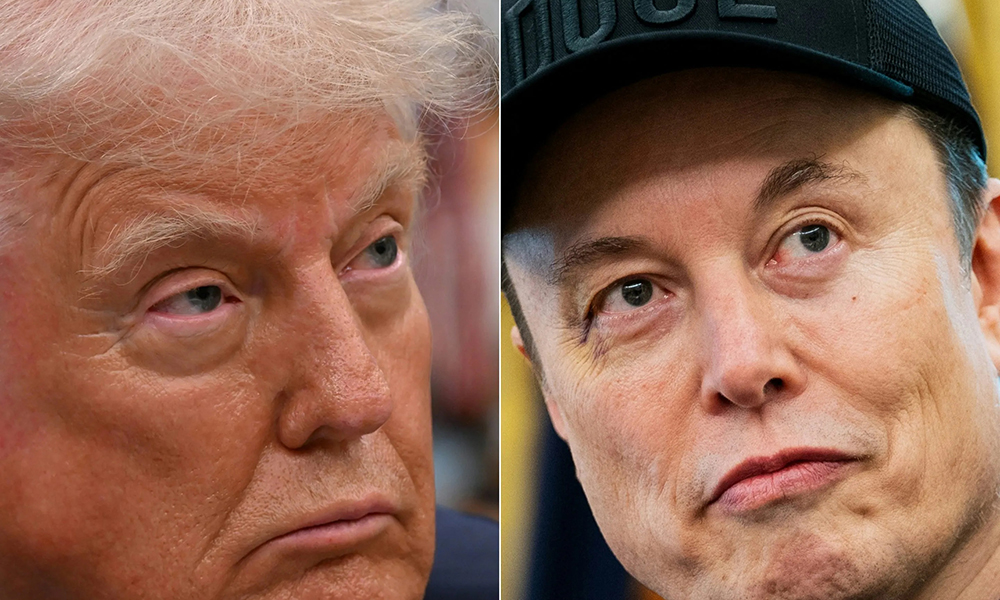
这场唐纳德·特朗普与埃隆·马斯克的惊人决裂,或许很快便会令特斯拉首席执行官的境遇愈发艰难——而对美国总统而言也未必有益。
部分政治评论员将上周的风波描述为又一位心怀不满的特朗普盟友离场,然而,总统对马斯克的怒火,似乎比其他亲信离职后更甚,例如副总统迈克·彭斯(Mike Pence)、司法部长杰夫·塞申斯(Jeff Sessions)和威廉·巴尔(Bill Barr)、国务卿雷克斯·蒂勒森(Rex Tillerson)和迈克·蓬佩奥(Mike Pompeo),以及国防部长詹姆斯·马蒂斯(James Mattis)和马克·埃斯珀(Mark Esper)。
这绝非一场商界领袖因越界而遭惩处的伪道德剧。鉴于马斯克的地位,他与其他表态支持或反对特朗普的首席执行官[如棒约翰(Papa John’s)、戈雅食品(Goya Foods)、MyPillow、可口可乐(Coca-Cola)、达美航空(Delta)或亚马逊(Amazon)的高管]截然不同。这亦非马斯克就持续攀升的国家债务或其他政治议题秉持原则性立场所引发的风波。相反,这场风波实则是两位不受约束、自上而下式领导人为争夺主导权而展开的较量。
“第一兄弟”
马斯克最大的失误在于对自身角色定位失准——他本应作为特朗普的顾问,却自视为核心角色。即便时至今日,他依旧高估了自己的重要性与不可替代性。
特朗普秉持“轮辐式”领导模式——将所有权力集中于自身,同时以分而治之的策略操控相互争斗的下属。他向来对妄图智取或约束自己的“智囊”极为厌恶,也绝不可能容忍任何自认为比“老大”更重要的商界领袖。
马斯克显然认为,财富与慷慨能为其提供庇护,并使他有资格扮演“第一兄弟”的角色。然而这一想法即便称不上是痴心妄想,也绝对是大错特错。
想想那些因狂妄而威胁到君主权威的顾问们:逐步操控沙皇尼古拉二世(Nicholas II)的俄罗斯神秘主义者格里高利·拉斯普京(Grigori Rasputin);被同时代人描绘为操控威廉·麦金莱(William McKinley)总统的“幕后操纵者”马克·汉纳(Mark Hanna);以及在一战后破坏伍德罗·威尔逊(Woodrow Wilson)总统凡尔赛和谈的亲密顾问爱德华·豪斯(Edward House)上校。这些大胆的顾问最终都因自负而落得被排挤甚至处决的凄惨下场。
来自俄罗斯的教训
回顾俄罗斯近期的历史便能窥见端倪。以尤科斯公司(Yukos)老板米哈伊尔·霍多尔科夫斯基(Mikhail Khodorkovsky)和瓦格纳集团(Wagner)老板叶夫根尼·普里戈任(Yevgeny Prigozhin)为例,他们曾公然挑战连特朗普都公开赞赏的铁腕人物弗拉基米尔·普京(Vladimir Putin)的权威。
在21世纪初尤科斯公司鼎盛时期,我们曾邀请米哈伊尔·霍多尔科夫斯基出席耶鲁大学CEO峰会。当时他几乎掌控着俄罗斯所有的油气储备。他在活动中直言不讳地批评普京,公开提出俄罗斯未来发展的不同路径。当他开始在俄罗斯国内四处宣扬这套理念——自认为普京需要他的资金和支持,因此不会对他下手——才意识到金钱并不能买来他所认为的那种保护。普京迅速采取行动,将霍多尔科夫斯基的资产国有化,并与他的商业对手结盟,瓜分了他曾拥有的巨大财富。
更近的还有,瓦格纳集团老板普里戈任认为,由于战场取得的胜利、原始军事力量以及全球财富,他的雇佣兵集团已变得不可或缺,因此他敢于挑战普京核心副手的权威,在Telegram上发布的视频中指责他们对俄乌冲突处理不当。当恐吓未能达成目的,他自认为能够率领部队进军莫斯科,在俄罗斯境内发动一场反对普京统治的叛乱。然而,他所期待的国内支持几乎毫无踪迹,这一妄想的荒谬之处暴露无遗。就在他因飞机坠毁身亡不久,人们不禁心生疑问:幕后黑手是谁?
自2022年俄乌冲突爆发以来,普里戈任是至少60名离奇死亡的俄罗斯知名人士之一。《今日美国》此前也记录了约40起类似事件,而实际数字可能更高。
马斯克的脆弱性
马斯克及其拥护者因其全球首富的身份而变得有恃无恐,显然已将过往此类教训抛诸脑后,抑或觉得这些教训与马斯克毫不相干。上周,马斯克在X平台上嘲讽道:“特朗普的总统任期还剩3.5年,而我却能存在40年以上。”他还呼吁弹劾特朗普,并指控其与已故恋童癖、涉嫌强奸的杰弗里·爱泼斯坦(Jeffrey Epstein)存在非法关联。
尽管马斯克旗下企业在不同程度上依赖政府支持,他仍做出上述举动。这些支持包括特斯拉获得的电动汽车税收抵免、SpaceX获得的合同,以及Neuralink和The Boring Company获得的监管批准。鉴于特朗普曾搁置美国国际电话电报公司(AT&T)与时代华纳(TimeWarner)的交易审批——该交易涉及的个人恩怨远不及他与马斯克的矛盾——人们不禁要问,特朗普如今会花多少时间来刁难马斯克。无论背景有何不同,马斯克或许都该牢牢记住霍多尔科夫斯基和普里戈任的教训。
与此同时,特朗普暗指马斯克对政府事务的关注实则出于商业利益考量,而马斯克则指控特朗普与爱泼斯坦有牵连——并且马斯克有资源资助一场反特朗普的“革命”,在此情形下,投资新闻媒体或许比投资人工智能或加密货币更具性价比。(财富中文网)
杰弗里·索南菲尔德(Jeffrey Sonnenfeld)是耶鲁大学管理实践莱斯特·克朗教授,同时担任耶鲁首席执行官领导力研究所的创始人兼所长。史蒂文·田(Steven Tian)是耶鲁首席执行官领导力研究所的研究主管。
Fortune.com上发表的评论文章中表达的观点,仅代表作者本人的观点,不代表《财富》杂志的观点和立场。
译者:中慧言-王芳
这场唐纳德·特朗普与埃隆·马斯克的惊人决裂,或许很快便会令特斯拉首席执行官的境遇愈发艰难——而对美国总统而言也未必有益。
部分政治评论员将上周的风波描述为又一位心怀不满的特朗普盟友离场,然而,总统对马斯克的怒火,似乎比其他亲信离职后更甚,例如副总统迈克·彭斯(Mike Pence)、司法部长杰夫·塞申斯(Jeff Sessions)和威廉·巴尔(Bill Barr)、国务卿雷克斯·蒂勒森(Rex Tillerson)和迈克·蓬佩奥(Mike Pompeo),以及国防部长詹姆斯·马蒂斯(James Mattis)和马克·埃斯珀(Mark Esper)。
这绝非一场商界领袖因越界而遭惩处的伪道德剧。鉴于马斯克的地位,他与其他表态支持或反对特朗普的首席执行官[如棒约翰(Papa John’s)、戈雅食品(Goya Foods)、MyPillow、可口可乐(Coca-Cola)、达美航空(Delta)或亚马逊(Amazon)的高管]截然不同。这亦非马斯克就持续攀升的国家债务或其他政治议题秉持原则性立场所引发的风波。相反,这场风波实则是两位不受约束、自上而下式领导人为争夺主导权而展开的较量。
“第一兄弟”
马斯克最大的失误在于对自身角色定位失准——他本应作为特朗普的顾问,却自视为核心角色。即便时至今日,他依旧高估了自己的重要性与不可替代性。
特朗普秉持“轮辐式”领导模式——将所有权力集中于自身,同时以分而治之的策略操控相互争斗的下属。他向来对妄图智取或约束自己的“智囊”极为厌恶,也绝不可能容忍任何自认为比“老大”更重要的商界领袖。
马斯克显然认为,财富与慷慨能为其提供庇护,并使他有资格扮演“第一兄弟”的角色。然而这一想法即便称不上是痴心妄想,也绝对是大错特错。
想想那些因狂妄而威胁到君主权威的顾问们:逐步操控沙皇尼古拉二世(Nicholas II)的俄罗斯神秘主义者格里高利·拉斯普京(Grigori Rasputin);被同时代人描绘为操控威廉·麦金莱(William McKinley)总统的“幕后操纵者”马克·汉纳(Mark Hanna);以及在一战后破坏伍德罗·威尔逊(Woodrow Wilson)总统凡尔赛和谈的亲密顾问爱德华·豪斯(Edward House)上校。这些大胆的顾问最终都因自负而落得被排挤甚至处决的凄惨下场。
来自俄罗斯的教训
回顾俄罗斯近期的历史便能窥见端倪。以尤科斯公司(Yukos)老板米哈伊尔·霍多尔科夫斯基(Mikhail Khodorkovsky)和瓦格纳集团(Wagner)老板叶夫根尼·普里戈任(Yevgeny Prigozhin)为例,他们曾公然挑战连特朗普都公开赞赏的铁腕人物弗拉基米尔·普京(Vladimir Putin)的权威。
在21世纪初尤科斯公司鼎盛时期,我们曾邀请米哈伊尔·霍多尔科夫斯基出席耶鲁大学CEO峰会。当时他几乎掌控着俄罗斯所有的油气储备。他在活动中直言不讳地批评普京,公开提出俄罗斯未来发展的不同路径。当他开始在俄罗斯国内四处宣扬这套理念——自认为普京需要他的资金和支持,因此不会对他下手——才意识到金钱并不能买来他所认为的那种保护。普京迅速采取行动,将霍多尔科夫斯基的资产国有化,并与他的商业对手结盟,瓜分了他曾拥有的巨大财富。
更近的还有,瓦格纳集团老板普里戈任认为,由于战场取得的胜利、原始军事力量以及全球财富,他的雇佣兵集团已变得不可或缺,因此他敢于挑战普京核心副手的权威,在Telegram上发布的视频中指责他们对俄乌冲突处理不当。当恐吓未能达成目的,他自认为能够率领部队进军莫斯科,在俄罗斯境内发动一场反对普京统治的叛乱。然而,他所期待的国内支持几乎毫无踪迹,这一妄想的荒谬之处暴露无遗。就在他因飞机坠毁身亡不久,人们不禁心生疑问:幕后黑手是谁?
自2022年俄乌冲突爆发以来,普里戈任是至少60名离奇死亡的俄罗斯知名人士之一。《今日美国》此前也记录了约40起类似事件,而实际数字可能更高。
马斯克的脆弱性
马斯克及其拥护者因其全球首富的身份而变得有恃无恐,显然已将过往此类教训抛诸脑后,抑或觉得这些教训与马斯克毫不相干。上周,马斯克在X平台上嘲讽道:“特朗普的总统任期还剩3.5年,而我却能存在40年以上。”他还呼吁弹劾特朗普,并指控其与已故恋童癖、涉嫌强奸的杰弗里·爱泼斯坦(Jeffrey Epstein)存在非法关联。
尽管马斯克旗下企业在不同程度上依赖政府支持,他仍做出上述举动。这些支持包括特斯拉获得的电动汽车税收抵免、SpaceX获得的合同,以及Neuralink和The Boring Company获得的监管批准。鉴于特朗普曾搁置美国国际电话电报公司(AT&T)与时代华纳(TimeWarner)的交易审批——该交易涉及的个人恩怨远不及他与马斯克的矛盾——人们不禁要问,特朗普如今会花多少时间来刁难马斯克。无论背景有何不同,马斯克或许都该牢牢记住霍多尔科夫斯基和普里戈任的教训。
与此同时,特朗普暗指马斯克对政府事务的关注实则出于商业利益考量,而马斯克则指控特朗普与爱泼斯坦有牵连——并且马斯克有资源资助一场反特朗普的“革命”,在此情形下,投资新闻媒体或许比投资人工智能或加密货币更具性价比。(财富中文网)
杰弗里·索南菲尔德(Jeffrey Sonnenfeld)是耶鲁大学管理实践莱斯特·克朗教授,同时担任耶鲁首席执行官领导力研究所的创始人兼所长。史蒂文·田(Steven Tian)是耶鲁首席执行官领导力研究所的研究主管。
Fortune.com上发表的评论文章中表达的观点,仅代表作者本人的观点,不代表《财富》杂志的观点和立场。
译者:中慧言-王芳
The spectacular breakup of Donald Trump and Elon Musk could soon get far worse for the Tesla CEO—while doing little good for the U.S. president.
Some political pundits have portrayed last week’s blowup as merely yet another exit by a disgruntled Trump ally. But the president’s anger toward Musk seems worse than his temper tantrums following the departures of other hand-picked loyalists, such as Vice President Mike Pence, Attorneys General Jeff Sessions and Bill Barr, Secretaries of State Rex Tillerson and Mike Pompeo, or Secretaries of Defense James Mattis and Mark Esper.
And it’s not a faux morality play about business leaders facing punishment for straying outside their lane. Musk, given his stature, is different than other CEOs who have taken pro-Trump or anti-Trump stances, whether from Papa John’s, Goya Foods, MyPillow, Coca-Cola, Delta, or Amazon. And this is not about Musk taking a principled stand on the soaring national debt or any other political issue. Instead, the blowup reflects two unrestrained top-down leaders fighting it out in a struggle for supremacy.
‘First buddy’
Musk’s biggest mistake was about the nature of his role—as an advisor to Trump, not the primary character he believed himself to be. Even now, he continues to overestimate his own importance and indispensability.
Trump, who relies on a hub-and-spokes model of leadership—where all power is centralized in himself while he divides and conquers his warring subordinates—has always been deeply resentful of consiglieres who try to outmaneuver or constrain him. Trump will never tolerate business leaders who believe they are bigger than the big boss.
Musk apparently believed that his money and largesse insulated him and entitled him to a greater role as “first buddy.” But that was misguided if not delusional.
Consider advisors with grandiosity who threatened to undermine sovereign bosses, including the Russian mystic Grigori Rasputin, who engineered creeping control over Czar Nicholas II; Mark Hanna, portrayed in his time as the grand puppeteer controlling President William McKinley; and President Woodrow Wilson’s close advisor Colonel Edward House, who undermined Wilson’s Versailles negotiations after World War I. All these audacious advisors found their presumption punctured by icing out or even execution.
Lessons from Russia
A look at recent Russian history is illustrative here. Consider Yukos boss Mikhail Khodorkovsky and Wagner chief Yevgeny Prigozhin after they dared challenge the power of Vladimir Putin, a strongman Trump has expressed admiration for.
We hosted Mikhail Khodorkovsky at our Yale CEO summits during the height of his power at Yukos in the early 2000s, when he controlled virtually all of Russia’s oil and gas reserves. He didn’t hesitate to criticize Putin at our events, openly presenting a different path for Russia’s future. When he started bringing his show on the road within Russia—thinking that Putin needed his money and support too much to whack him—he learned his money didn’t buy him the protection he thought it did. Putin quickly moved to nationalize Khodorkovsky’s assets, forming an alliance with his business rivals to divvy up his once-great wealth.
More recently, Wagner boss Prigozhin believed his mercenary group had become so indispensable—thanks to its battlefield triumphs, raw military might, and global wealth—that he could challenge the authority of Putin’s top lieutenants, blasting them in videos posted on Telegram for mishandling the Urkaine invasion. When Prigozhin failed to sway them with this bullying, he thought he could get away with marching on Moscow with his forces and starting an insurrection within Russia against Putin’s rule. The full delusion of this folly was revealed when little of the domestic support Prigozhin expected materialized. Not long after he died when his plane plunged out of the skies, the victim of sabotage—one wonders by who.
Prigozhin was among at least 60 prominent Russians who have met suspicious deaths since the start of Putin’s invasion of Ukraine in 2022. USA Today documented around 40 such cases prior to then as well, and the actual number is likely to be even higher.
Musk’s vulnerability
Musk and his defenders, emboldened by his status as the world’s wealthiest person, apparently have either forgotten such lessons or don’t think they apply to Musk. Last week, Musk taunted on X, “Trump has 3.5 years left as president, but I will be around for 40+ years.” He also called for Trump’s impeachment and accused him of being illicitly connected to the late pedophile and accused rapist Jeffrey Epstein.
Musk did all this despite his companies depending on government support in one way or another. That includes Tesla via EV tax credits, SpaceX via contracts, and Neuralink and the Boring Company via regulatory clearances. Given that Trump held up regulatory clearances of the AT&T-TimeWarner deal—which involved less personal animus than his feud with Musk—one wonders how long he could gum up the works for Musk now. Musk might be well served to remember the lessons embodied by Khodorkovsky and Prigozhin, however different the contexts.
Meanwhile, with Trump insinuating Musk’s government interest is motivated by commercial self-gain and Musk accusing Trump of entanglement with Epstein—and having the resources to fund an anti-Trump counterrevolution—the news media might be a better investment than AI or cryptocurrency.
Jeffrey Sonnenfeld is the Lester Crown Professor in Management Practice and president and founder of the Yale Chief Executive Leadership Institute. Steven Tian is the director of research at the Yale Chief Executive Leadership Institute.
The opinions expressed in Fortune.com commentary pieces are solely the views of their authors and do not necessarily reflect the opinions and beliefs of Fortune.






